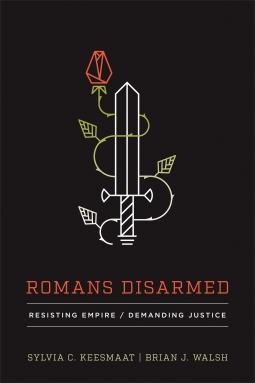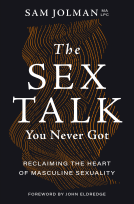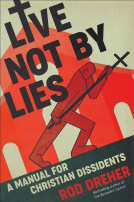
Romans Disarmed
Resisting Empire, Demanding Justice
by Sylvia C. Keesmaat; Brian J. Walsh
This title was previously available on NetGalley and is now archived.
Send NetGalley books directly to your Kindle or Kindle app
1
To read on a Kindle or Kindle app, please add kindle@netgalley.com as an approved email address to receive files in your Amazon account. Click here for step-by-step instructions.
2
Also find your Kindle email address within your Amazon account, and enter it here.
Pub Date May 21 2019 | Archive Date Jun 21 2019
Baker Academic & Brazos Press | Brazos Press
Talking about this book? Use #RomansDisarmed #NetGalley. More hashtag tips!
Description
Following their successful Colossians Remixed, Sylvia Keesmaat and Brian Walsh unpack the meaning of Romans for its original context and for today. The authors demonstrate how Romans disarms the political, economic, and cultural power of the Roman Empire and how this ancient letter offers hope in today's crisis-laden world.
Romans Disarmed helps readers enter the world of ancient Rome and see how Paul's most radical letter transforms the lives of the marginalized then and now. Intentionally avoiding abstract debates about Paul's theology, Keesmaat and Walsh move back and forth between the present and the past as they explore themes of home, economic justice, creation care, the violence of the state, sexuality, and Indigenous reconciliation. They show how Romans engages with the lived reality of those who suffer from injustice, both in the first century and in the midst of our own imperial realities.
Advance Praise
“Sylvia and Brian are two of my favorite Bible scholars. Whether you’re over-churched or under-churched, they stir in you a fresh curiosity for the Bible. This new book is perfect for scholars and new Bible readers alike, and for everyone in between. They rescue one of the most misused books of the Bible from the hands of colonizers and crusaders. And they help us listen with first-century ears to the anti-imperial love story of Romans.”—Shane Claiborne, author, activist, and cofounder of Red Letter Christians
“If you want to hear—and experience—Paul’s letter to the Jewish and gentile Christ-followers in Rome as you never have, read this book. And re-read it. Study it in your church circles. Talk about it with your friends. Assign it in your courses. As with their earlier Colossians Remixed, Keesmaat and Walsh have once again interwoven close textual reading of the New Testament (they clearly love the Scriptures!) with its unabashedly Jewish roots and its explosive relationship to the Roman imperial context. Most importantly, they bring the message of Romans into dialogue with our lives today, as we struggle to be faithful to the good news of Messiah Jesus in our own imperial context.”—J. Richard Middleton, professor of biblical worldview and exegesis, Northeastern Seminary at Roberts Wesleyan College
“In 1918 Karl Barth published his commentary on Romans, which ignited a profound theological turn. A century later, Keesmaat and Walsh write into the headwinds of Trumpism, deepening social disparity, ecological crisis, and endless war. Building on recent scholarship, this brilliant study engages the original audience, who labored under the shadow of empire, in a way that brings its message to life for similarly struggling North American Christians. The authors employ a robust imagination, an interlocutor, and keen historical literacy to free Romans from its captivity to dogmatic and pietistic interpretations, restoring it to its social context (with all its disturbing parallels to our own). The result is a fresh and committed reading by two of our generation’s best interpreters of Word and world. May it, too, inspire a turning!”—Ched Myers, Bartimaeus Cooperative Ministries
Available Editions
| EDITION | Other Format |
| ISBN | 9781587432842 |
| PRICE | $34.00 (USD) |
| PAGES | 432 |
Links
Featured Reviews
 Christian W, Reviewer
Christian W, Reviewer
Every once in a while, a book comes along that challenges the way that we read the Bible. In some instances, the change could be in how we read the cultural context surrounding the book, like EP Sanders and James Dunn challenged us to do in the 70's. Some offer new angles on books, like NT Wright and Scot McKnight have done with Philemon. And, in some cases, we are asked to consider current hot-button issues through the lens of the text, which is where Romans Disarmed comes in.
Authors Sylvia and Keesmaat and Brian Walsh challenge what we know about Romans, asking us to consider new angles on the text. These new angles? They are wide ranging, varying from Pauline challenges to Empire, ecological theology, and economic ideologies. Most students or readers familiar with Romans won’t see this – I certainly didn’t from the start.
This is where one of the book’s most unique angles comes in. The book challenges our traditional readings using both exegesis and imaginative readings. That second part might scare prospective readers away – and the authors are quite aware of that. But the book is not all imagination. When necessary, the authors are capable and willing to argue from the Greek. For example, they engage in a discussion on how English translations render “wickedness” and “righteousness” when they could also use “injustice” and “justice”.
The authors call on us to us our imaginations in a variety of ways. At the beginning, we are invited into a story focusing on Indigenous peoples in Canada and their relationship with the government. This story is full of the joys of these people, but also their sorrows. This helps the authors understand that Paul was also writing Romans out of a place of sorrow (Romans 9:1-5), using the communal sorrow and grief as entry points into the epistle.
We are also introduced to imagined Roman citizens, who represent the first hearers of the text. These two imagined characters are used as ways we can enter into the first century and hear the text the way that they might’ve. In that we do not have a view of marginalization, these characters are some readers’ only way to hear some of the ways Paul helps the marginalized move into the center of the kingdom.
I can’t speak to the success of this method for everybody – and I don’t think anybody would want me to. I can only be honest about my own experience with the texts. From the start, I was hesitant to engage in the imaginative exercises that they brought us through. The authors foresee this, though, and create a fictive conversation partner who voices a lot of push back readers like myself have. Seeing that the authors foresaw this push back and worked to address it in the book itself, rather than after the fact, helped me engage in their imaginative world a bit better. In general, these were somewhat helpful in illustrating their points, but I don’t know if I was ever able to come alongside their practice. I wonder now how much my cishet white privilege position was in engaging more fully with this book, but I don’t know how to judge that yet. In that, I am excited to hear reviews and conversations from people of color, women, and others who are not white cishet men.
Having addressed one of the first hurdles blocking total engagement with the book, I want to (somewhat) briefly discuss the themes and ideas explored in the book. Thankfully, the authors provide definitions of all of their terms, and your mileage may vary in terms of how closely they match contemporary and popular usage. Broadly, the books tackles the way (the authors believe) Romans addresses homelessness, the relationship between ecology and economy, and sexual ethics.
“Paul is concerned about the shape of the oikos, the household of creation and the household of faith. This makes him, in the broadest sense of the term, an eco-theologian, not only because a theology of the land, a theology of creation, is woven throughout his epistle to the Romans, but also because his letter as a whole is an attempt to engender an alternative home among the followers of Jesus at the heart of empire.”
Using the paradigm of the relationship between Jew and Gentile, we are invited to see how Romans is formed on the basis about becoming a “homed” people. The church is shaped as a counter-cultural home to all people, so that no one is left on the margins that the Empire pushes them to.
In what is probably the most profitable (unfortunate pun) section, we are invited to explore the relationship between our idolatry, the economy, and the ecological disaster scientists say we are barreling toward. Even if you aren’t convinced Romans is directly addressing ecological theology, this is a tremendously helpful section which warrants engagement. We are helpfully invited into lamenting the state of the enviroment and repenting of the sins we have committed which have brought us here, but shown our eschatological hope of resurrection and God’s renewal.
In the end, I am excited to see how the conversation around this book goes. The book is well-written, engaging, and didn’t fail to keep my interest. As a “more traditional” student, I had a hard time engaging the methodology, but I think any reader should do their best to lean into the work as best they can. If it is not true that Paul had ecology/economic relationships, homelessness, and contemporary social issues in mind, this book would still not be a complete waste. There is still a lot to be learned about these issues, and ways to discuss them biblically, that we can learn from this book. In the meantime, you can read more about the book from Baker here. You can pre-order it from Amazon here.
I received a review copy of this book from NetGalley. I wasn’t required to write a good review, only an honest one, to get the copy.
You don’t have to be in full agreement, or even significant agreement, to find a book, conversation, or experience with another transformative.
And so it was with Romans Disarmed: Resisting Empire / Demanding Justice by Sylvia Keesmaat and Brian Walsh.
It’s hard to characterize this book because it is trying to be three or four books in one. At one level, it is a commentary on Paul’s Letter to the Romans. At another level, it is a treatise to the powers that be, political and religious, rooted in what seems to be pretty standard fully progressive liberation theology. Within it is a dialogue between the authors and an imagined seeker. And it also features some historical imagination, creating the story of “Nereus,” a Jewish man who has found himself in Rome, working in a craft, having learned of Jesus and part of the church, attempting to remain undefiled by idolatry, and “Iris,” a slave woman from Mauretania who has a child and serves a pagan master but has come to learn of Jesus and meets with the church. And the authors have plenty to say about the people with whom they’ve ministered and served, especially among the First Nations, in Toronto.
To this end the book is very long and could have easily been multiple books; thus my reading of it was on and off for years.
I’m not a fan of the lengths to which they go in their liberation theology. I am willing to grant the overarching purposes of Paul as they understand him in terms of Romans 1:18-31, but their category error in presuming their Victorian framework of sexual identity carves out a justification of same-sex sexual relationships never really grapples with the words Paul actually used and especially how lesbianism, in particular, was of almost no concern to the Romans, but was singled out by Paul. Notable also Paul is understood almost entirely in Greco-Roman, and not Second Temple Jewish, terms in that discussion. There’s definitely an agenda there.
The book will prove disorienting to those familiar with the commentary and exegetical genres, but that disorientation is not all bad. The historical imagination used regarding “Nereus” and “Iris” is exceptionally well done: sure, they’re fictive, but their stories absolutely well reflect the kind of situations which actual people from those kinds of backgrounds in those socio-economic conditions would be facing, of which most middle-class Christians today would not understand and find completely disorienting and impossible. Few things will make you as uncomfortable as having to grapple with what it would mean for a slave woman professing Christ like “Iris” to submit to her pagan master when he has a predilection for enjoying her sexually (cf. Ephesians 6:5). The experience of first century Rome among the poor and the slaves is hard for middle class Americans of the 21st century to understand, and I have not found many resources which better exemplify and illustrate the context in this way.
The commentary is very well informed regarding historical context, and whatever you might end up saying about the portrayal of what Paul has to say, it at least is liberated from the 16th century dogmatic shackles which have been imposed upon his words.
But perhaps the authors would go too far the other way, liberating Paul from one framework only to force him conform to a late 20th/early 21st century progressive liberation framework retrojected into the first century. This is not to deny Paul is speaking a word for those living in the midst of the beast and the oppressive state; it’s not as if the authors come up with all of this whole cloth.
If you’re preaching or teaching in Romans, it’s good to grapple with this work, even in significant disagreement. Your perspective will be broadened a bit, and that’s a good thing.







